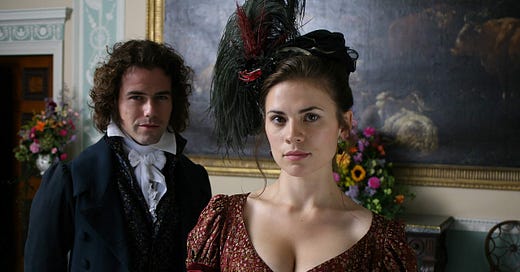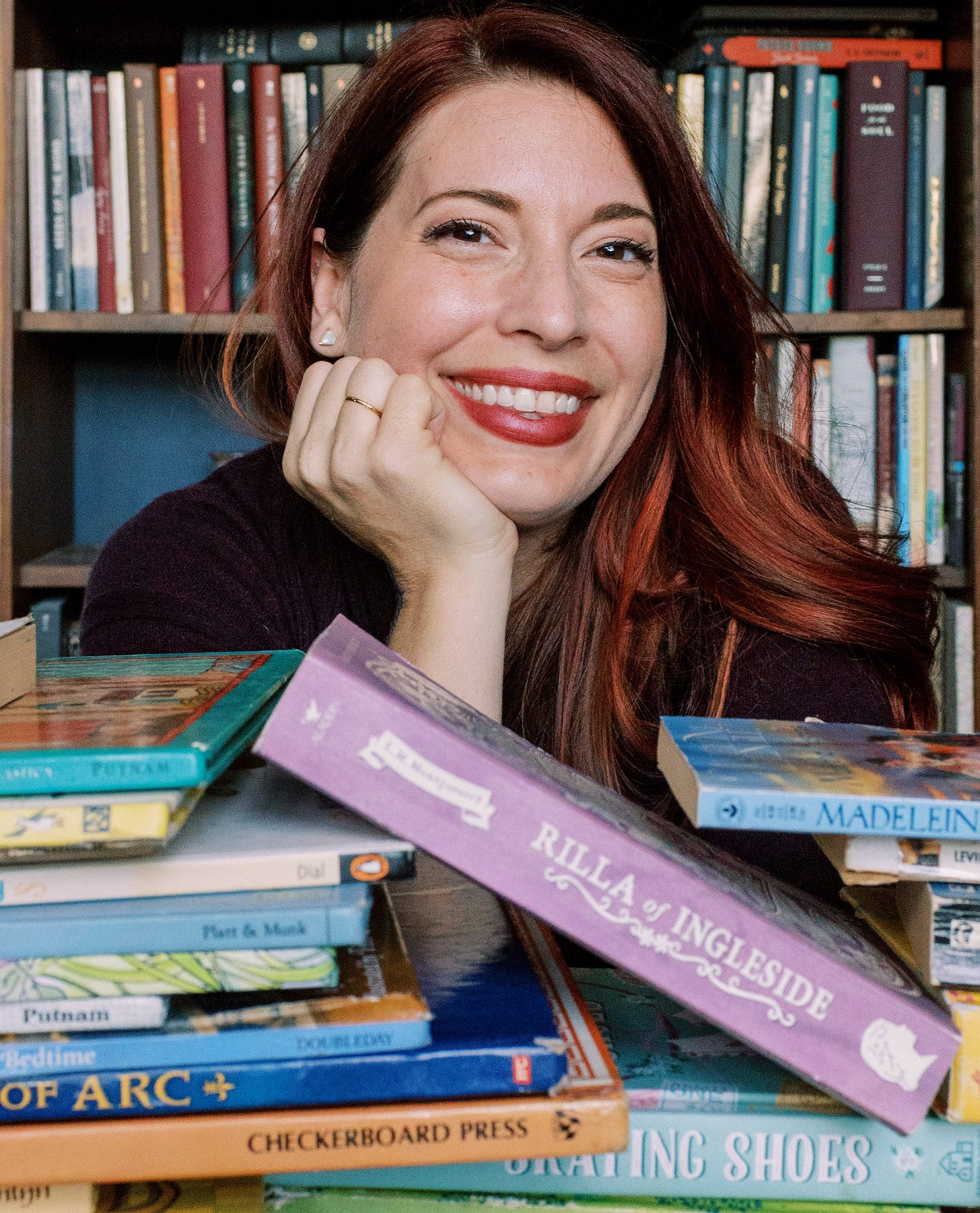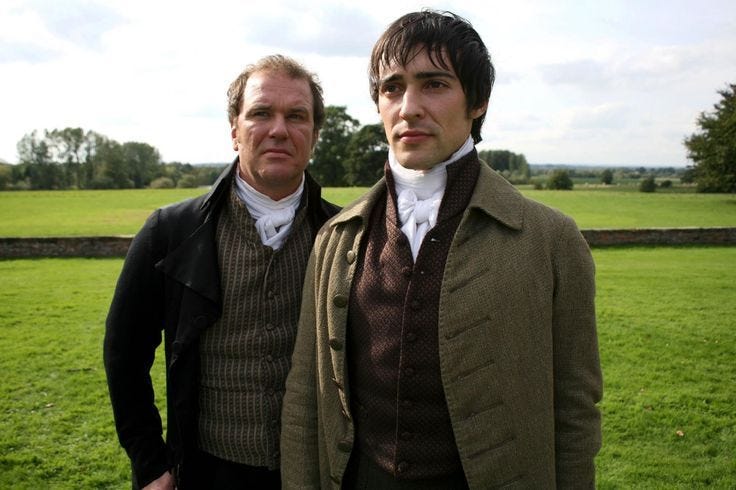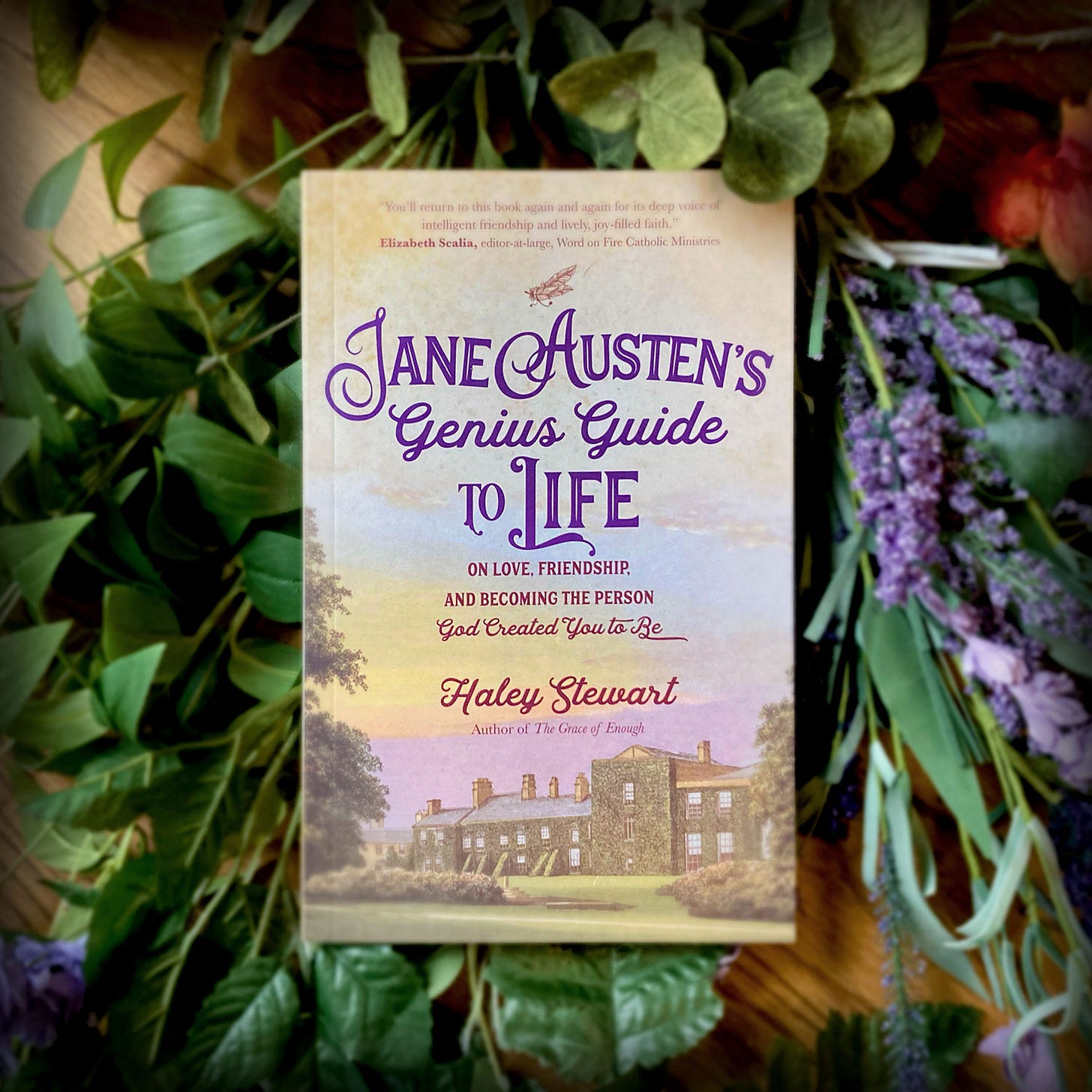If you’re new to this Substack, welcome! Many folks found me last week through
(hello!) so, perhaps a mini introduction is in order?I’m Haley:
bibliophile
writer (non-fiction for grown-ups, fiction for kids)
editor of a children’s imprint (Word on Fire Spark)
occasional speaker and pilgrimage leader
wife of 17 years to a whisky distiller
mom of 4 kids ages 4-14
One of the things I’m offering subscribers in 2023 is A Year with Jane. We’re reading through Austen’s six novels this year and Mansfield Park is our read for May and June.
This is a reader-supported publication. To receive new posts and support my work, consider becoming a free or paid subscriber.
The Charm Is Broken
I’ve heard from some of you that you’ve found Mansfield Park to be a bit of a slog.
It’s certainly slower-paced than some of Austen’s other novels and the story and characters are less familiar (which can make it harder to follow). And then there’s the matter of the protagonist, Fanny Price, being a more difficult heroine to love due to her extremely reserved personality.
But I’d argue that the last few chapters of Mansfield Park are some of Austen’s best. So much happens! Fanny is sent to her family of origin for a visit. While the novel is very hard on the superficial manners of the rich that are matched by no genuine internal virtue, Austen does not present Fanny’s poor relations as especially virtuous, either. Fanny is mortified by her father’s drunkenness, her mother’s bad household management, and the lack of education of her siblings. The whole nightmare of a visit surely made an offer of marriage by a wealthy man all the more enticing. Henry Crawford could provide her with the stability and respectability of her own estate where she could help her sister out of poverty. And his attachment to her was clearly motivating positive change on his part. He wanted to be worthy of Fanny and despite her humiliating family, offers them only kindness and dignity.
Your comments on my last Mansfield Park post about Henry Crawford were so insightful! If you haven’t gotten a chance, definitely go back and read them all.
You have to wonder if Fanny would have eventually agreed to the marriage if Henry stayed the course. But, of course, he does not stay the course. Soon after visiting Fanny’s family, he starts flirting with Mrs. Maria Rushworth again. This indiscretion begins the catastrophic and very public demise of Maria’s marriage, any possibility of a life with Fanny, and any chance for Edmund Bertram and Henry’s sister Mary Crawford to wed.
The scene between Edmund and Mary that he later recounts to Fanny is one of my favorites. The charm is broken. Edmund can see Mary for what she is. Her only concern is with public opinion and her only frustration with Henry and Maria’s adultery is that they weren’t more clever about concealing it. Edmund is grieved at their sin. Of course he’s alarmed by the public consequences of such a scandal, but he’s primarily distraught over what they’ve done. Mary seems to have no sense of the gravity of what has occurred, chalking it up to “foolishness.” Edmund cannot believe that they see the situation so differently. He is no longer able to deceive himself about Mary.
Infatuation is an interesting thing. All of us can remember a time when we ourselves (or someone close to us) filled in all the unknowns about a person according wishful thinking to create a fantasy human being. By ignoring anything they do that contradicts the person we have created in our minds, the fantasy can be maintained—for a time. But Edmund finally sees what Fanny saw from the beginning. And while it’s satisfying for Edmund to face reality, it’s a sad moment. Mary is flawed, but she’s not a monster. Her moral education was so poor and her models for life so insufficient that certain parts of her character were never formed. Edmund notes rightly that had Mary been in better hands, she would have made a remarkable woman. The thwarted potential of both Mary and Henry is tragic. They are both genuinely attracted to virtue (in Edmund and in Fanny). If only they had cultivated the virtues necessary to grow alongside them!
Sir Thomas, the Duggars, and Authoritarian Parenting
It’s notable that while the responsibility of this scandal between Maria and Henry lies primarily at their own feet, Sir Thomas also acknowledges culpability. He knew better than to let Maria marry a rich fool, but it was convenient—socially and financially. And he never developed close relationships with his daughters. He was a disciplinarian, not a confidant. He maintained the order and dignity of his household with rigidity and severity. But his authoritarian manner did not teach his children to cultivate virtue, only to conceal their true selves under a veneer of respectability. And Austen notes that specifically, he did not pass on genuine religious devotion to his daughters.
I think this is a wakeup call to those of us who are parents. Do we know our children—know their very hearts? Are they at ease coming to us with their worries, their struggles, and their mistakes? Are we focusing on certain behaviors instead of cultivating real virtues that will guide our children long after they’ve left our household? I’ve been musing on the (difficult to watch) documentary, Shiny Happy People, about the Duggar family and the Institute for Basic Life Principles movement that guided their parenting and family life. Yes, you can force children to submit to your authority through physical force. You can have children who behave according to your expectations in public under threat of severe discipline. But do those children love what is good or simply fear their parents? What is lurking beneath the surface?
You can’t help but pity Maria Rushworth. She learned only to fear her father, not develop real virtue and discernment. She was taught to prioritize wealth and position above all else. Her mother was physically present but absent. Her aunt’s flattery made her self-obsessed. If Sir Thomas had considered what was best for his children, he would have sent away Mrs. Norris long ago. But his vision was impeded by his own flaws: his focus on superficial trappings of respectability, his willingness to make moral compromises for wealth, and his inability to develop real relationships with his children.
What do you think? What could Sir Thomas have done differently? What can we learn from his parenting failures? How can parents cultivate virtue in their children and close relationships built on love rather than fear? What do you think will happen to Henry and Mary now that they are separated from the Mansfield Park family? Let’s discuss in the comments!
Reading schedule:
Week of May 7th:
Gather your books. There are many editions out there, so just grab what’s on your shelf or at the local library. And if you enjoy audiobooks, this is an excellent novel to enjoy with a great narrator. My favorite for this novel is Juliet Stevenson’s audiobook version. Grab Jane Austen’s Genius Guide to Life from Ave Maria Press (use STEWART20 for 20% off) or from Amazon.
If you didn’t start reading with us in January, you may want to catch up by reading the Introduction and Chapters 1-3 of Jane Austen’s Genius Guide to Life to set the stage.
Week of May 14th:
Chapters 1-9 of Mansfield Park
Week of May 21st:
Chapters 10-18 of Mansfield Park
Week of May 28th:
Chapters 19-24 of Mansfield Park
Week of June 4th:
Chapters 25-31 of Mansfield Park
Week of June 11th:
Chapters 32-40 of Mansfield Park
Week of June 18th:
Chapters 41-48 of Mansfield Park
Week of June 25th:
Chapter 4 of Jane Austen’s Genius Guide to Life
TBA: Zoom Discussion with special guests.
Caveat:
On the reading schedule I have suggested reading the chapter about Mansfield Park after finishing the novel. This is because as a reader I hate spoilers. But if you’ve already read the novel or are familiar with the story and want a resource to help you dive deeper as you re-read it, feel free to read Chapter 4 of Jane Austen’s Genius Guide to Life first.
I’ll be sending out weekly reflections and discussion questions to consider as you read. If you want to read faster or slower, go for it. This is fun, not homework.
If you know someone who would enjoy reading Austen with us for our Year of Jane, please share this post with him/her!
And I postponed our live Zoom on Emma because one of our special guests has had two unexpected deaths in her extended family (please keep her in your prayers). I’ll be in touch about that event when we’re ready to reschedule.
All Jane Austen book club emails and 2023 emails will continue to be available with a free subscription. But this is a reader supported effort. Consider supporting this literary Substack by upgrading to a paid subscription.
And if you know someone who would love this virtual book club, please share with them:
Looking forward to discussing Mansfield Park with you!
Haley
(Editor of Word on Fire Spark, Author, Former Podcaster)
Haley’s Children’s Mystery Series about Mouse Nuns
Haley’s Book on Jane Austen’s Novels
Haley’s Book about Radical Simplicity








A timely comparison Haley! I have been thinking about parenting and forming children a lot also since the Shiny Happy People documentary released, which I also watched (acknowledging shortcomings and biases of any documentary).
I suppose the first change in parenting comes from looking at ourselves. So much of what we hold firm can be driven by fear, pride or misplaced desire. It’s not bad to want safety, morality and good futures for our children- but at the expense of what? They may be virtuous and happy being poorer, more adventurous or in a marriage different than we expected. Slowing down to consider the unique person that is the child, their strengths and flaws, requires presence, adaptability and hope. We realize we cannot turn away but are needed more and more- more time, deeper intention, more help- - sacrifice! We realize we are small, need prayer and grace, and then each season choose how to form them and with what resources.
I guess one parallel from SHP and Mansfield Park would be we think that one certain ‘mold’ will form the child, each child, to be who we want them to be. We can plug that in and plot that course and then check out.
It’s worked for someone else, it’s worked for the generations before us, its the way things are always or ‘should’ be done, it’s worked for this subset of people. Again, it’s good to have a vision, but adaptability is required according to one’s circumstances. The mold may work for one of our children, and not another. The mold may work for one family, but not ours. Perhaps we have a child with a unique struggle- could be willful or innate. Or a wife who is not present, or meddling family members- we can’t change others much!
One thing I note about both Mansfield Park and SHP is that the families in raising their children chose ignorance, which is frightening. They ignored their true circumstances and what change that would necessitate, and decided that was too much trouble, too embarrassing, too wild to deviate from their pre-decided ‘norm’.
I would argue this is in opposition to Catholic values (I’m Catholic so think this way, we can say Christian too 🙃) or what they should be. Choosing to turn away from the reality of your situation and trusting that what has always been done, the method of family living you have been told will save you, will make everything all right. And then doubling down in that trajectory without ever changing course even a little.
I believe Catholic values tell us: let’s live in reality! Here is the world before you- let’s look at it as it stands. Let’s not hide from it- or hide from ourselves. There is good, and there is evil. Here they are - see them, look at them, acknowledge them. And knowing these things- let us educate! Ponder. Receive grace for surely we need it. Go to confession! See the expanse of people on our community, in all spectrums! Show grace. Be little and humble ourselves.
And then let’s still aim to choose for ourselves, and influence our children to choose, the good and the virtuous above all else, no matter where we are.
How did Edmond turn out so well?
Yes, he's got a major blind spot where Mary is concerned, but he's got excellent moral principles and lives virtuously. How did he pick that up when his three siblings failed?
My best guess is that when he was away at school he must have had a truly inspirational teacher. Maybe in his theology classes. Julia and Maria had a governess at home and had no break from Sir Thomas's authority or Aunt Norris indulgence. Tom was the heir and would have had more people sucking up and no reason to work. So maybe Edmond as the second son intended for the church had an openness to his vocation that left him more open to education outside the home.